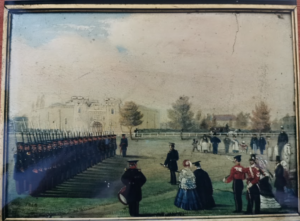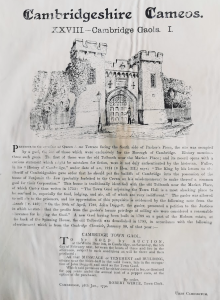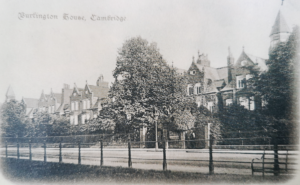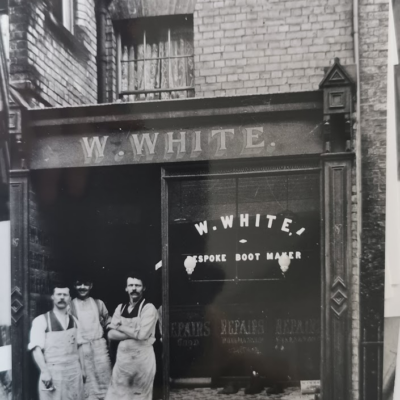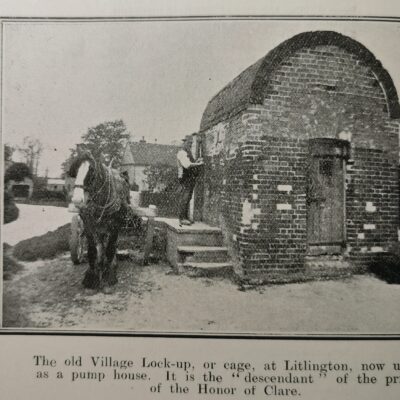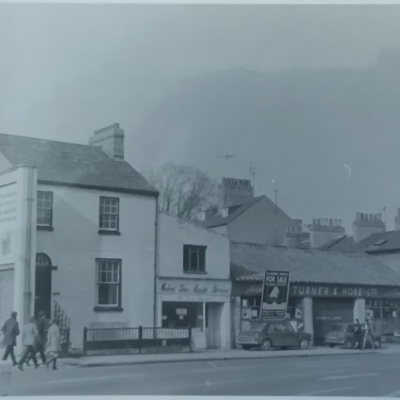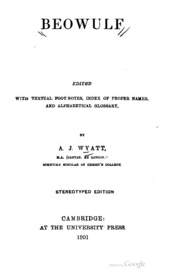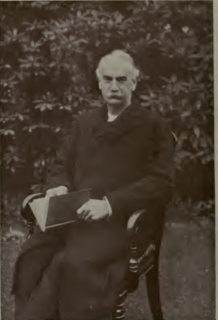Search by topic
- archaeology
- architecture
- bricklayer
- Building of Local Interest
- carpenter
- church
- crime
- dressmaker
- fire
- Great Eastern Railway
- listed building
- medieval
- oral history
- Public House
- Rattee & Kett
- Religious House
- Roman
- scholar
- school
- Then and Now
- tudor
- women
- work
- world war one
- world war two
Search by text
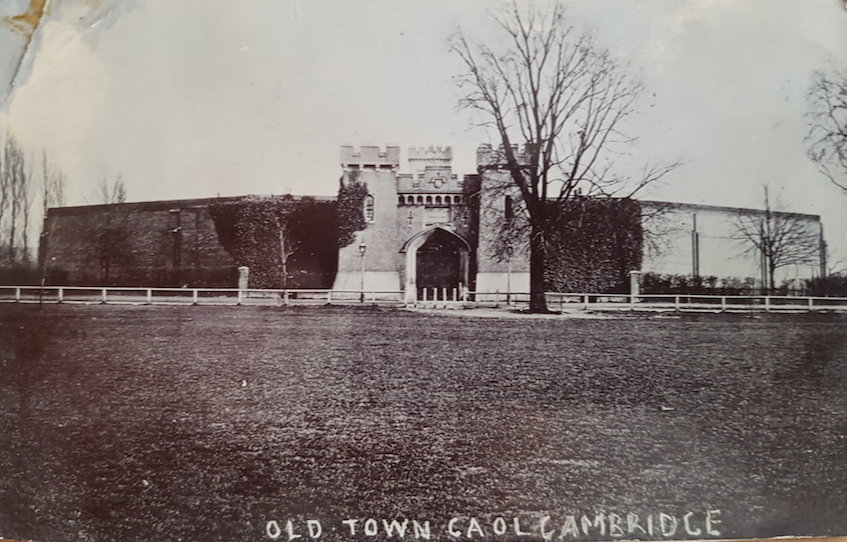 Cambridge Town Gaol c.1870, Gonville Place
Cambridge Town Gaol c.1870, Gonville PlaceCambridge Town Gaol / Queen Anne Terrace / Kelsey Kerridge Sports Centre and Queen Anne Car Park
History of Cambridge Town Gaol
Cambridge Town Gaol was built in 1827 at a cost of £25,000 and survived until demolished 15/5/1879. It was designed by William M’Intosh Brookes.
1837
Frederick Mortlock, grandson of John Mortlock the banker, was arrested for the first time, on the charge of writing threatening letters to his uncle, Thomas Mortlock, who owned the bank. He committed to 2 years in prison unless he could find two sureties of £100 each. Frederick stayed in prison for three months and then escaped. He was advised to return to Cambridge where he was rearrested subject to the sureties being paid. No-one in his family offered but he did persuade Mr Ekin, landlord of The Hoop, to put up surety. After this Frederick went to visit his father in France to get some more money. He then returned to Cambridge and lived in a house on Bridge Street occupied by the head waiter at the Hoop Inn.
For more detail see ‘Cambridge to Botany Bay’ by A E Clark-Kennedy, 1983.
1839 – 1865 John Edes was governor. he kept a journal
1844
From the journal, 22.1.1844:
Read morning prayers in chapel. Had occasion to speak to the female prisoners who in my opinion were behaving improperly on entering it. Visited 5 prisoners in solitary confinement. Called the surgeon to the attention of a convict under sentence of transportation.
1851
John Edes, 42, gaol governor, b St Neots
Ann, 42, b Westminster
Martha Stevens, 24, b Exning
Thomas Smith, 47, gaol turnkey, b Fenstanton
Sarah Smith, 49, gaol matron, b Norfolk
Emily Smith, 21, gaol schoolmistress, b Cambridge
Frank Smith, 19, scholar, b Cambridge
Harriet Smith, 12, scholar, b Cambridge
Charles Crick, 43, gaol turnkey and Chelsea Pensioner, b Cambridge
The diaries of “The Guv’nor” John Edis of Cambridge Town Gaol
[Editor’s note – the census list of prisoners follows. In order to make the census names clearer they have been put in bold. An attempt has been made using the British Newspaper Archive to find either the incident that lay behind the individual being in gaol in 1851. Where another incident has been found that seems to clearly identify that particular prisoner, this has been included as well.]
William Huckle prisoner, 52, labourer, b Comberton
Harry Cromer prisoner, 43, labourer, b Cambridge
William Ready prisoner, 46, Chelsea Pensioner, b Cambridge
Joseph Caskin prisoner, 32, shoemaker, b Stapleford
James Peck prisoner, 24, labourer, b Cambridge [1841 aged 9 no.2 Adam & Eve Row}
Joseph Welch prisoner, 23, labourer, b Cambridge [Cambridge Chronicle 7/12/1850: Joseph Welch, John Welch, George Bolton and Joseph Morris, all of Buntingford, labourers, appeared to answer information of George L Lilley of Wallington, for having on the16th Nov. last, trespassed upon his land in search of rabbits. Defendants having all admitted the offence were respectively convicted, Joseph Welch in the penalty of £2 and 9s 9d costs, and in default 2 months’ hard labour, and the others in the penalty of £1 and 9s 9d costs each, and in default 1 calendar month’s hard labour. The three latter having made default, were committed to Hertford gaol.]
John Newitt prisoner, 57, labourer Chelsea Pensioner, b Cambridge [Cambridge Independent 30/3/1850: found guilty of setting fire to a stack of wheat straw, the property of Mr Henry Lawrence of Ely. Newitt, described as ‘a well-dressed, respectable man,’ addressed the judge prior to sentencing, “My Lord, I wish to state, if you will allow me, that when I set fire to Mr Lawrence’s stack, I had no animosity against him, I was governed by no evil intention. I had had a little liquor and under its influence I committed the offence: a foolish one I now admit and I am very sorry for it: I was sorry at the time and as it was proved in evidence, I gave myself up to the constable soon afterwards. Under these circumstances I hope your Lordship will show me leniency.” He was sentenced to seven years transportation. Other arsonists at the same sentencing were transported for 15 to 18 years.
Charles Collis prisoner, 23, ?? Stainer, b Huntingdon [Cambridge General Advertiser 5/1/1850: THEFT OF A GREAT COAT. CHARLES COLLIS, aged 31, and JOHN SHADBOLT, aged 21, labourers, Cambridge, committed on November 26th, were charged with stealing a great coat, the property of Alfred Baxter, tailor, Bury St. Edmunds. Mr. Tozer appeared for the prosecution; Mr. NAYLOR for the prisoner Shadbolt. Alfred Baxter sworn: deposed that he lives at Bury St. Edmunds, and is a tailor by trade. Was in Cambridge on Saturday, the 21th of November. Went about three o’clock to a house in Fitzroy Street. The house is kept by Mrs. Pryke. Had a great coat with him. When he went into the house he gave the coat to Mrs. Pryke to put away. Saw her hang it in the back parlour. Was about to leave the house about seven o’clock. Did not find the coat. Saw it again on the Sunday after. It was then in the possession of p. c. Robinson. He had given information immediately he discovered his loss. It was worth about 30s. Is certain the coat he saw in Sergeant Robinson’s possession is his property.
Mrs Ann Pryke called—Was in a house in Fitzroy Street, on the 24th of November. Knows Alfred Baxter. He came there on that day. Knew him in Bury St. Edmunds, of which place she is a native. He gave a coat into her charge. Witness hung it in the back kitchen, but the nail being drawn out, doubled it, and laid it on a chair. Knows the prisoner Collis. Saw him in the back kitchen on the day of the robbery. Saw him more than once that day. He was in the habit of going on errands for the girls. There were three girls in the front parlour. These were two Miss Gardiners, and witness’s daughter. The last time Collis came in, was between five and six o’clock. Baxter wanted to go away about seven o’clock. He came to witness and asked for his coat. Went to look for it, but found it was gone. Saw Collis about eight, and accused him of stealing the coat.
Cross-examined : Does not live amongst the beauties of Barnwell, but with the beauties of Bury. Her daughter stayed six weeks in Barnwell. Witness came here because she had business in Cambridge. The prisoner Collis had been trusted a good deal by the girls. Does not know that the back of the house is called “Devil’s Row.” There is a back and a front entrance to the house. Does not keep Terms at Cambridge. Her daughter is 26 years of age and a single woman. Her daughter took a house to stay six weeks.
P.c. Clements deponed to taking the prisoner Collis into custody.
Esther Gard[i]ner, a nymph of the pavé, but quite a beauty for her profession, being sworn, deposed to seeing Collis in the house of Mrs. Pryke on the 24th of November, when she heard him say he took the coat.
Mark Levi, a Jew, being sworn according to the form of his persuasion, deponed that he lives at the Castle public house, Butcher Row. Is a dealer in clothes and cigars. Knows the prisoner Shadbolt by sight. Saw him on the morning of the 25th November. Was walking towards Midsummer Common, when Shadbolt asked him if he would buy a coat. He took witness to where it was. It was in a public house across the bridge. Gave him 15s. for the coat, and took it home. There was no inquiry about it till the evening. Gave it to p.c Robinson. Is positive it was the coat he bought of Shadbolt.
Cross-examined : His name is not Captain White nor Captain Brown. His name is not Jaggard, or he would have a good situation. Never went by the name of Captain White. “Markey Sharkey” is not over his door. They might call him “Darkey” if they liked. Two names would cost him more for his license. Never lived in the neighbourhood of Petticoat Lane, London. Never spoke to any one about the coat before he saw Shadbolt. Does not know a man named Swain. Does not know a Mr. Bell of Emmanuel College. Has been all over Emmanuel College. Does not recollect giving his watch to a gentleman while he went to fetch a coat which he charged him with stealing. Never took away a coat by mistake from Emmanuel College.
Sergeant Robinson deposed to taking the prisoners into custody.
The jury then brought in a verdict finding Collis guilty as libelled, and Shadbolt guilty of receiving the coat knowing it to have been stolen. A further count in the indictment charged Collis with having been previously convicted of felony, and Thomas Storey, turnkey at Huntingdon jail, was called on to prove the charge.
The learned Recorder then sentenced Collis to be transported for seven years; and Shadbolt to be imprisoned for two years and kept to hard labour.
The Grand Jury brought in the following deliverance, viz.: “The Grand Jury beg to present, that it has appeared in evidence that the house, No. 82 Fitzroy Street in which the robbery upon Alfred Baxter was committed is a notorious brothel, and that the stolen [text too unclear on scan to read]
[Also Charles Collis, Cambridge Chronicle and Journal 23/10/1847: Stealing a Turkey at Brampton.— Charles Collis, 28, labourer, and George Moss, 20, labourer, were charged with having stolen a turkey, the property the Right Hon. the Earl of Sandwich.—Mr. Cadogan prosecuted, and Mr. Leapingwell defended Collis. —From the evidence of Mr. Achurch, it appeared that on Saturday, the 20th September, he saw the prisoners driving some turkeys towards a hedge, and he saw Moss throw a stick and knock one down: he killed it and put it in his pocket. Collis was standing by. Witness went to the prisoners, when they offered to pay double the value of the turkey sooner than go before a magistrate. When James Bradshaw, p.c., apprehended the prisoners, Moss offered to pay for the turkey, and Collis wished that the turkeys and stick had been somewhere else.— Guilty —two months’ hard labour. ]
Thomas Tempany prisoner, 21, labourer, b Cambridge [Cambridge General Advertiser 5/1/1850: THOMAS TEMPANY, FREDERICK PERKINS and THOMAS MAYES, labourers, were charged with stealing a quantity of ducks and fowls the property of Edward Favell. The prisoners pled not guilty.
Charles Rookes sworn—ls servant to Mr. Fayell at his farm on the Mill-road. On Saturday night, December 22nd, saw the fowls safely locked up. Next day found all the ducks and 21 fowls gone. The door appeared to have been opened by a pick-lock key. Three pairs of shoes which he saw in the possession of a policeman correspond exactly with the foot-prints in the field.
P. c. Chapman sworn—Saw Rookes on Sunday morning, the 23rd December. He gave him information about a robbery at Mr. Favells. Went up the Mill-road. There had been a slight frost. The foot-marks were very plain under the hedge. Found feathers, of which he took a sample. Went along with p. c. Stearn to a house in Union-road where the prisoners lived. Also found feathers there and now produces them. Compared the shoes of the prisoners with the marks in the field. They exactly corresponded.
P.c. Stearn corroborated the evidence of the preceding witness, when the Recorder summed up.
The jury brought in a verdict of guilty against all the prisoners.
Mr. Edis, Governor of the gaol, stated that Mayes had been convicted previously not fewer than seven times, and Tempany five times since May, 1817. Perkins he had not any knowledge of.
The recorder then sentenced Mayes to transportation for fourteen years; Tempany to imprisonment for two years; and Perkins to six months imprisonment. The prisoner Tempany made use of some offensive remark on leaving the docks, and Mayes shook hands with several of his companions in crime. ]
[Also Thomas Tempany, Cambridge Independent 24/11/1849: Thomas Tempany was charged with attempting to pass a bad half crown on Wednesday last to Mr Nicholls of New Street. Pc 18 was sent for to take the prisoner into custody upon the charge, when he struck the officer in the eye and forehead and made his escape. He was not taken again till yesterday. Fined 10s, and in default of payment, he was committed for a month’s hard labour.]
John Shadbolt prisoner, 23, boot closer, b Cambridge [See Charles Collis above]
Harry Talslier prisoner, 24, tailor, b Cambridge
John Bell prisoner, 27, labourer, b Cambridge
Frederick Watts prisoner, 25, shoemaker, b Cambridge [Cambridge Chronicle 29/6/1850: Daniel Holmes and Frederick Watts, stealing tame rabbit, the properly Sarah Haycock, and tame rabbit, the property of Joseph Farnham, labourer.]
Harry Whitehead prisoner, 22, mat maker, b Cambridge [Cambridge Independent 12/5/1849: Harry Whitehead and William Canham were charged with stealing some trotters. William Huckel, vendor of those delicacies, said that on Monday night he was in Sussex street with his stock-in-trade, when the boys said they wanted some trotters ; he uncovered his basket, and Canham took one or two; Huckel told him to keep his hand out of the basket, when Canham struck him with a trotter in the eye and ran off. Whitehead, who had been helping himself, followed his companion, but was captured in King-street. Canham eventually offered to settle the matter.—The Magistrates, in consequence of the bad character of the prisoners, and Whitehead having appeared six or seven times before, treated them as rogues and vagabonds, and sent them to trot on the mill for a month. ]
John M Ludyre prisoner, 28, labourer, labourer, b Cambridge
Abraham Cook prisoner, 19, labourer, b Cambridge [Cambridge Chronicle 15/9/1849: James Blackwell, James Shedd, and Abraham Cook, were charged with stealing 1s. 6d., a knife, and a tobacco box from the person of Robert Clark of Meldreth. They had all been together at a public-house, called the Jolly Butchers, in Barnwell, and when the prosecutor left the three prisoners followed him and pulled him down in the road, and robbed him, one of them holding his hand over his mouth meanwhile. The prosecutor was very stupid fellow, and gave a very vague account the transaction: he was big enough to have well thrashed the three prisoners had he been so minded. In answer to a question from Blackwell, he said he did leave the public-house with a girl, and they walked up the road together. The prisoners asserted that he left with two men, and three girls, and a pot of beer, which was taken to the residence the ladies. Cook was not distinctly spoken to as having been concerned in the robbery and was discharged: the other two were committed to the sessions.]
Henry Jessup prisoner, 19, labourer, b Oxford [Cambridge Independent 28/12/1850: Henry Jessop (18) stealing a silver fork and spoon, the property of Henry Over]
Thomas Glover prisoner, 17, labourer, b Cambridge [Cambridge Independent 28/12/1850: Thomas Glover (18) stealing potatoes, the property of James Creeke]
William Cabrock prisoner, 26, grocer, b Suffolk
James Ball prisoner, 25, labourer, b Leicester
John Rogers prisoner, 17, labourer, b Cambridge [Cambridge General Advertiser 11/12/1850: James Balls and John Rogers were brought up on remand from yesterday (Tuesday) week. The defendants were charged with wilfully uttering and offering a counterfeit shilling by Mary Moore, publican, of St. Andrew the Less, on Saturday, the 30th November, between 8 and 9 in the evening. The substance of the charge has been previously detailed. Mr. GARRATT appeared for the prisoner Balls. Thomas Mudd, son of the prosecutrix, deposed that his mother gave Balls two shillings in change for a half-crown. Rogers was present. Shortly after Balls gave him one of the shillings and demanded another, saying it was bad. He insisted upon having a good shilling. His mother refused to change it, declaring that she had no such shilling as that returned. Rogers was then absent. The counterfeit shilling being produced, Henry Scott, Wm. Hinds and other witnesses deposed to paying good shillings to Mrs. Moore on the day in question. The shilling produced was not the shilling given by them to prosecutor. They would neither take nor pay such a bad shilling. The prisoners were then fully committed. ]
William Longstaff prisoner, 15, general servant, b Chesterton [Cambridge Independent 28/12/1850: William Longstaff (18) obtaining under false pretences 1lb of tea from Mr Thomas Rowe.]
William Simmons prisoner, 26, boot closer, b Surrey
George Whittaker prisoner, 63, general dealer, b Herts [convicted of arson with his son, see below]
Thomas Whittaker prisoner, 30, general dealer, b Essex [See 63 Sidney Street. Both father and son were sentenced to transportation for life.]
George Trelford prisoner, 23, brushmaker, Cheshire [Cambridge Chronicle 22/3/1851: George Trelford (20), Macclesfield, labourer, pleaded guilty to a charge of having stolen a waistcoat, the property of James Hodson, Cambridge, and was sentenced to one month’s imprisonment, with hard labour.]
James Brown prisoner, 27, tailor, b Manchester [Cambridge Independent 6/7/1850: Stealing a Purse and Sixpence.— James Brown (26), described as traveller and tailor, was charged with stealing a purse and sixpence, the property of Emma Flack. — Mr. Metcalfe for the prosecution; Mr. Naylor for the prisoner. —The prosecutrix and her mother were in the Market-place about five o’clock on Saturday, the 1st June. They were talking together at the corner of the Petty Cury, and a man, now charged to be the prisoner, was seen by her mother to put his hand into the prosecutrix’s pocket. The prosecutrix then missed her purse and money, which were found by butcher named Brown, who had a stall near the spot. The prisoner ran away to the opposite side of the market. The prosecutrix’s mother said, in giving her evidence, that the prisoner was the man. He was met, as he was running away, by police constable Foster, who at nine o’clock apprehended him at the Race Horse. — Mr. Naylor said it was not likely that a great man like the prisoner should pick the prosecutrix’s pocket. It was more likely that it was done by a little boy, who it was proved by the evidence was standing near the time.— “Guilty:” six calendar moths’ hard labour. ]
William Hunt prisoner, 19, labourer, b Cambridge
Thomas Brown prisoner, 38, labourer, b Dorset
Samuel Gillett prisoner, 58, labourer, b London [Cambridge Chronicle 8/3/1851: Samuel J Gillett charged with having feloniously stolen 2 ice-pails and a water-pot, the property of George Brooker, confectioner, Cambridge, pleaded guilty – seven years transportation]
Hammond Watson prisoner, 18, baker, b Girton [Cambridge General Advertiser 6/7/1850: Girton – Hammond Watson was charged with breaking open the house of the constable of this place. The case was remanded till Thursday when the prisoner was committed for trial.]
Robert Harvey prisoner, 32, errand boy, b Needingworth [Cambridge Chronicle 1/3/1851: Robert Harvey charged with having obtained under false pretences the sum of £5, the moneys of Thomas Parker of this borough.]
Charles Dellar prisoner, 16, shoemaker, b Cambridge [Cambridge Chronicle 1/3/1851: Charles Dellar charged with having stolen a quantity of slates, the property of Messrs Webster of this borough.]
Edward Camps prisoner, 40, labourer, b Surrey
Robert Welsh prisoner, 16, labourer, b London
Abraham Mayes prisoner, 30, labourer, b Cambridge [Cambridge Independent 24/2/1849: Abraham and William Mayes, two brothers, were charged with being drunk and disorderly, and assaulting several policemen in the execution of their duty.—Thomas Bond, who keeps the County Anns, opposite the County Courts, stated that the prisoners came into his house on Monday last, between nine and ten o’clock in the evening, and called for a pint of beer, which was refused ; whereupon William Mayes became very abusive and threatened to break the clock, which he tried do. Mr. Bond then went for a policeman, and when he came hack he found the prisoners had broken two tables and a lot of other things, which he valued at 15s. 16s.—P.-c. Robinson stated that when he was about to take the prisoners into custody both struck him, and Abraham Mayes knocked him down with chair; but, some more policemen coming to his assistance, they were taken the station.—The Magistrates committed William Mayes prison for two months, and Abraham Mayes for one month, with hard labour. ]
John Stonebridge prisoner, 27, gardener, b Cambridge [see William Mayes]
John Offley prisoner, 60, painter, b Bourn
James Apthorpe prisoner, 37, labourer, b Cambridge [Cambridge General Advertiser 3/5/1848: James Apthorpe, was charged with an assault on p.c. No. 5, who stated that be was sent for to his father’s on Saturday. Defendant was in the yard very drunk and disorderly, and had been breaking the windows. He was given into my charge, but refused to go, and turned round and struck me, and afterwards bit me; I was obliged to handcuff him, and he was taken to the station on the stretcher, where he struck me violently on the ear. Fined 10s, or 14 days’ imprisonment. Cambridge Chronicle 27/6/1846: James Apthorpe was charged by PC.Casburn with stealing a quantity of lead from Maid’s Causeway, the property of Mr Deighton, & John Cook was charged with being concerned in the same robbery. They were both remanded until Saturday. Apthorpe said he did not take the lead; it laid the footpath as he was going home.]
Henry Jarman prisoner, 27, brickmaker, b Cambridge [Cambridge Chronicle 14/2/1852: Henry Jarman, a notorious Barnwell ruffian, was charged with being a rogue and a vagabond, and lurking about Wellington Row, between three and four o’clock this morning, with intent to commit a felony. Committed to prison for 21 days with hard labour.]
William Gray prisoner, 21, labourer, b Cambridge [Cambridge General Advertiser 2/3/1850: Esau Bennett charged William Gray with assaulting him on Saturday evening. Defendant, with a number of others, were standing by complainants house. He requested him to go away which he refused to do and struck him. Fined 2s 6d and costs, or 14 days hard labour]
Martha Tatton prisoner, 34, labourer’s wife, b Norfolk
Mary Ann Andrews prisoner, 31, labourer’s wife, b Fenstanton [Cambridge General Advertiser 6/7/1850: Obtaining money under false pretences – Mary-Ann Andrews (31), wife of John, was charged with obtaining the sum of £10 under false pretences with intent to defraud Patrick Beales.
The following the the document by which the money was obtained:
“Sir, – I feel myself very much a bliged to you if you will due me a kindenes to let me ave the sum of £10 until Satday you will a blidge me if you will. I am youers moast obedeant, Mr Thurnall, Duxford. Mr Beales, Merchant, Cambridge.”
Mr. Mills prosecuted, the prisoner was defended by Mr. Naylor. The prisoner is the wife of a labouring man at Shelford, and is the suspected party as having tried the tame dodge at two or three other places in the town.
Mr. Mills called Mr. Patrick Beales the younger, who stated that on the 3rd of April, between two and three, the prisoner came to the counting-house and presented the note in question, saying that she had seen his father, who had sent her for the money, which he gave her—namely, a £5 note and five sovereigns. On inquiry of his father, he found the money had been obtained under fraudulent pretences. Information was given to Sergeant Hackney and the witness, in company with him, went to Shelford on the 8th of April, and identified the prisoner as the person who had presented the note.
Master EDWARD BEALES corroborated his brother’s evidence.
The two witnesses underwent a long cross examination by Mr. Naylor, but without any effect.
Sergeant Hackney said that, in consequence of a description given of the prisoner, he went in company of Mr. Beales to Shelford, when be immediately identified the prisoner, and she was taken into custody.
Mr. Charles Thurnall said the note was not in his handwriting, neither did he ever give her any authority to receive or borrow money from Mr. Beales, nor did he even know her.
Mr. Beales never gave the prisoner any authority to receive money, nor did he know her.
Mr. Naylor submitted that the fake pretence had not been made out; that there was no proof whatever that she had said that the note was sent by her from Mr. Thurnall.
After considerable discussion, the learned Recorder overruled the objections raised by the Counsel.
Mr. Naylor then addressed the jury, contending that the identity of the prisoner was not fully proved, and that no article of dress described by Mr. Beales had been produced, though a strict search had been made by Hackney. The learned counsel also laid great stress upon what be considered the false pretences, contending there was too little proof to convict.
The learned Recorder then summed up the evidence, and explained the law upon the subject.
The jury, after some abort consultation, found the prisoner Guilty.
Mr. Naylor moved the court in arrest of judgment, on the ground of a plurality of pretences, whereas the court had ruled there was only one pretence. The learned counsel proceeded to recapitulate his former arguments as regards the badness of the indictment.
The Recorder, however, was against the learned counsel, and said be could see no reason for reserving the point, or sending it for consideration to the higher court.
A case cited by Mr. Naylor was sent for, and handed up for the inspection of the Recorder, who, on looking at it, said it confirmed his previous opinion. The prisoner was then called up for judgment, and sentenced to twelve months’ hard labour. This trial lasted upwards of four hours.]
Elizabeth Tent prisoner, 37, labourer’s wife, b Sutton [Cambridge General Advertiser 20/11/1850: Elizabeth Tent was charged with stealing two brooches, the property of Mr. Crouch, jeweller of Sydney-street.—The defendant had been lodging at the prosecutor’s house for about two months; about a week after she had been there, two brooches, which were kept in an unlocked cupboard on the same landing as the prisoner’s room, were missed. On Saturday last she left her lodgings, and Mr. Crouch had a padlock affixed to the door of her room. She returned on Tuesday night, when he charged her with stealing the brooches, which charge she at first strenuously denied ; but upon his threatening to send for a policeman, she said she had one of them, which she would fetch. Mrs. Crouch went with her to her room, and soon returned bringing with them a landscape brooch; the other is a sham amethyst. They are worth about 8s. each.—Remanded. THURSDAY. Elizabeth Tent was again brought up on a charge of stealing brooches.—Jane Whitby, the prisoner’s sister, said that her sister had shown her a brooch, the stone of which was of a puce colour (which resembled that missed). Mrs. Crouch said that she went with the prisoner to her room, when she took the landscape brooch from her work-box.—The prisoner said that she had given 5s. 6d. and some other articles for the brooches. -Committed. ]
Margaret Smith prisoner, 25, hawker, b Bedford [Cambridge Chronicle 8/2/1851: Margaret Smith, lodging at the Racehorse, Barnwell, was charged with being in the house of Mr. Apthorpe, brewer, Newmarket road, about six o’clock yesterday evening, for some unlawful purpose. The defendant called Tuesday evening last, she as she said, to thank Miss Apthorpe for her kindness some time since, when she was ill: she stated that Miss Apthorpe had been kind to heron that occasion ; and although Miss A. told her she had no knowledge her whatever, she wished to press her acceptance of a piece of lace, which she declined, and in order to get rid of her gave her a shilling. Last night the prisoner again called, and Mr. Apthorpe (who was not at home on the former occasion) questioned her as to her business, &c., but her answers being any thing but satisfactory, he sent for a policeman, and had her taken into custody: when at the station she was recognised as answering the description of a person complained of by several inhabitants, whom she had endeavoured to impose upon in a similar manner. The above facts being clearly proved, the magistrates sentenced her to two months imprisonment, stating they hoped it would be a caution to such imposters for the future, as it was their determination to punish them severely if brought before them. ]
William Mayes 21, labourer, b Cambridge [see Abraham Mayes above; Cambridge Chronicle 5/7/1851: Assaulting a Policeman. Abraham Mayes (30), William Mayes (21), George Offley (27), and John Stonebridge were indicted for having assaulted and beaten John Howlett, police-constable of this borough whilst in the execution of his duty. – Mr. Mills conducted the prosecution; Mr Naylor defended Offley and Stonebridge; Mr. D. Brown defended Abraham and William Mayes.— On the night Saturday, the 22nd of March last, about midnight, prosecutor, who was on duty in Castle-street, heard the cry of murder, and near the County Courts saw prisoners: William Mayes had been ill-treating an old man named Flack, and son-in-law, Robinson, a printer: he attempted to take him into custody, but was prevented by Abraham, who got in his way: he then took Abraham into custody : a scuffle ensued, and he was knocked down, and brutally kicked and otherwise ill-used by the prisoners: he was taken into public-house in a state of insensibility, and has not, nor is likely to recover from the injuries he received. The intentions of the parties might be imagined from the expressions used, viz., “Kill the -,” etc. The counsel for the prisoners contended that the policeman was not in the execution of his duty, as he had no right to take Abraham Mayes. —The Recorder pointed out to the jury that, under the Town Police Clauses Act, and also 9 Geo. lV., the policemen had a right to apprehend any person who obstructed him, or prevented him from taking another person. —Guilty. —The RECORDER said he was empowered to sentence the prisoners to two years’ imprisonment, with or without hard labour; and in what case, if not in this, was the law to be applied. He should award the extreme punishment allowed by law, which was that the prisoners be imprisoned for two years with hard labour.—The prisoner Offley declared he was not one of the parties, and asked his fellow prisoners. Stonebridge said Offley was not there, to which the two Mayes’ also nodded assent.]
George Offley 21, labourer, b Cambridge [see William Mayes]
Jane Ashton 45, labourer’s wife, b Coton
Mary Shaw 32, housekeeper, b Upwell [Cambridge General Advertiser 23/10/1850: Mary Shaw was indicted for stealing some sheets and other articles the property of Thomas Wright of Fulbourn. Mr Worlledge appeared for the prosecution and Mr Naylor for the prisoner. Guilty. Sentence, six calendar month’s imprisonment.]
Sarah Page 26, prostitute, b Cambridge [Cambridge Independent Press 11/1/1851: Receiving Sheets and Napkins.—Robert Hall (28), Sarah Page (26), and Ann Page (61), charged with having stolen, at Bottisham, divers sheets and napkins the property of the Rev. John Hailstone. The two females were also charged as receivers.—Mr. Worlledge for the prosecution; Mr. Naylor for the prisoner Hall; there was no counsel for the other prisoners. —The linen was bought with subscription money, of which the prosecutor, Vicar of the parish, had the disposal, and was kept in the National School. On the night of Monday, the 21st of October, the school was entered, by means apparently of a picklock key, and was stripped of the property. The prisoners resided at Cambridge. On the following Saturday, police-sergeant Smith and pc. Howlett, in consequence of information, searched Hall’s house, in New Street. Sarah Page lived with him. Three napkins were found there, and three more at Ann Page’s. Sarah Page claimed the napkins as her property, – Mr. Naylor contended that there was no evidence against Hall, as he was not seen near Bottisham on the night of the robbery, and it was not shown that he dealt with the property. The Chairman, in summing up, said he did not think there was any evidence against Ann Page, or against Hall. Sarah Page had claimed the property, and said she had bought it at Wallis’ on Peas Hill.—Verdict, Sarah Page, “Guilty” of receiving. The other prisoners, “Not Guilty” —The Court sentenced Sarah Page to six calendar months’ imprisonment and hard labour. ]
Elizabeth Wayman 42, washerwoman, b Histon
Caroline Glisson [Cheeson] 18, general servant, b Soham
Ann Roberts 28, hawker’s wife, b Warwick
Maryann French 18, dressmaker, b Essex [Cambridge Chronicle 22/3/1851: Stealing a muff &c. Mary Ann French, (19), was charged with having stolen a muff and other articles, the property of Elizabeth Wright of Cambridge, dressmaker.
Mr Cooper appeared for the prosecution; the prisoner was undefended. Prisoner went on the 15th of February last to lodge with prosecutrix, and staid with her one week; after she had left the property was missed, and it was afterwards found at a Mrs Jenkinson’s, Russell Street, where the prisoner had gone to reside. Guilty – six months’ hard labour.]
Marther Jarvis 21, prostitute, b Cambridge [Cambridge Independent 18/11/1848: Martha Jarvis applied for a summons against a young man name Juler for injuring her door. Juler sought admittance; Martha modestly opposed it, and she refused to unlock, when he smashed the lock. Summons granted. Cambridge Chronicle 29/3/1851: Martha Jarvis, a prostitute was charged with being drunk and disorderly in Petty Cury about 11 o’clock last night. Fine 5s and committed for 7 days.]
Eliza Owen 26, prostitute, b Biggleswade
Mary Townsend 28, field labourer, b Sawston [Cambridge General Advertiser 18/12/1850: Mary Townsend was charged with assaulting Hannah Slattan of Sawston on the 2nd instant. The defendant, who did not appear, lives in the same house with the complainant, which is a double tenement, with only one staircase, in which the assault took place. Fined £1 and 13s expenses, or 21 days imprisonment.]
For consolidated data on those tried at Cambridge courts in 1851 see:
Criminal Register Cambridge 1851
For data on those convicted in 1851 and later transported see:
1861
John Edes, 52, governor of Borough Gaol, b St Neots
Ann, 52, b Westminster
servant
2 prison officers
22 prisoners identified by their initials, age, occupation and place of birth
1871
John Edis [sic], 63
Ann, 62
servant
matron
assistant matron
head warden and family, cook, servant and second warden
27 prisoners identified by initials, age, occupation and place of birth
In 1876 Robert Browning the murderer was hung here, the first execution at the gaol. The gaol surgeon at the time was James Hough.
Further information can be found here:
http://www.creatingmycambridge.com/history-stories/cambridge-town-gaol/
See also Enid Porter: Crime and Punishment
Its location is where Queen Anne’s Terrace is now.
1879
Demolition of the gaol enabled the building of Queen Anne Terrace
Contemporary:
Kelsey Kerridge Sports Centre
Queen Anne Car Park
Contribute
Do you have any information about the people or places in this article? If so, then please let us know using the Contact page or by emailing capturingcambridge@
License
This work is licensed under CC BY-NC-SA 4.0








